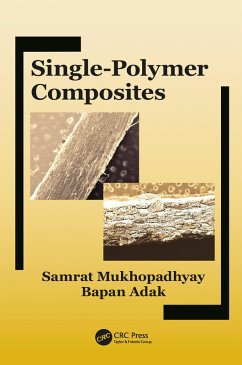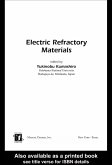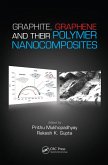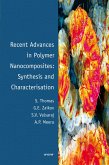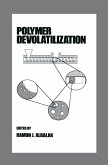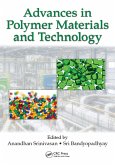48,95 €
48,95 €
inkl. MwSt.
Sofort per Download lieferbar

24 °P sammeln
48,95 €
Als Download kaufen

48,95 €
inkl. MwSt.
Sofort per Download lieferbar

24 °P sammeln
Jetzt verschenken
Alle Infos zum eBook verschenken
48,95 €
inkl. MwSt.
Sofort per Download lieferbar
Alle Infos zum eBook verschenken

24 °P sammeln
- Format: PDF
- Merkliste
- Auf die Merkliste
- Bewerten Bewerten
- Teilen
- Produkt teilen
- Produkterinnerung
- Produkterinnerung

Bitte loggen Sie sich zunächst in Ihr Kundenkonto ein oder registrieren Sie sich bei
bücher.de, um das eBook-Abo tolino select nutzen zu können.
Hier können Sie sich einloggen
Hier können Sie sich einloggen
Sie sind bereits eingeloggt. Klicken Sie auf 2. tolino select Abo, um fortzufahren.

Bitte loggen Sie sich zunächst in Ihr Kundenkonto ein oder registrieren Sie sich bei bücher.de, um das eBook-Abo tolino select nutzen zu können.
This book discusses the concept of single polymer composites (SPCs), their preparation, properties and factors affecting the manufacturing of this class of composites. Addressing the concerns of the researchers, it also answers intriguing questions in the field of SPCs with suitable references.
- Geräte: PC
- mit Kopierschutz
- eBook Hilfe
- Größe: 25.58MB
Andere Kunden interessierten sich auch für
![Electric Refractory Materials (eBook, PDF) Electric Refractory Materials (eBook, PDF)]() Yukinobu KumashiroElectric Refractory Materials (eBook, PDF)385,95 €
Yukinobu KumashiroElectric Refractory Materials (eBook, PDF)385,95 €![Graphite, Graphene, and Their Polymer Nanocomposites (eBook, PDF) Graphite, Graphene, and Their Polymer Nanocomposites (eBook, PDF)]() Graphite, Graphene, and Their Polymer Nanocomposites (eBook, PDF)198,95 €
Graphite, Graphene, and Their Polymer Nanocomposites (eBook, PDF)198,95 €![Recent Advances in Polymer Nanocomposites: Synthesis and Characterisation (eBook, PDF) Recent Advances in Polymer Nanocomposites: Synthesis and Characterisation (eBook, PDF)]() Sabu ThomasRecent Advances in Polymer Nanocomposites: Synthesis and Characterisation (eBook, PDF)61,95 €
Sabu ThomasRecent Advances in Polymer Nanocomposites: Synthesis and Characterisation (eBook, PDF)61,95 €![Polymer Devolatilization (eBook, PDF) Polymer Devolatilization (eBook, PDF)]() Polymer Devolatilization (eBook, PDF)441,95 €
Polymer Devolatilization (eBook, PDF)441,95 €![Advances in Polymer Materials and Technology (eBook, PDF) Advances in Polymer Materials and Technology (eBook, PDF)]() Advances in Polymer Materials and Technology (eBook, PDF)50,95 €
Advances in Polymer Materials and Technology (eBook, PDF)50,95 €![Engineering with Rigid PVC (eBook, PDF) Engineering with Rigid PVC (eBook, PDF)]() Engineering with Rigid PVC (eBook, PDF)64,95 €
Engineering with Rigid PVC (eBook, PDF)64,95 €![Mechanical Properties of Ceramics and Composites (eBook, PDF) Mechanical Properties of Ceramics and Composites (eBook, PDF)]() Roy W. RiceMechanical Properties of Ceramics and Composites (eBook, PDF)64,95 €
Roy W. RiceMechanical Properties of Ceramics and Composites (eBook, PDF)64,95 €-
-
-
This book discusses the concept of single polymer composites (SPCs), their preparation, properties and factors affecting the manufacturing of this class of composites. Addressing the concerns of the researchers, it also answers intriguing questions in the field of SPCs with suitable references.
Dieser Download kann aus rechtlichen Gründen nur mit Rechnungsadresse in A, B, BG, CY, CZ, D, DK, EW, E, FIN, F, GR, HR, H, IRL, I, LT, L, LR, M, NL, PL, P, R, S, SLO, SK ausgeliefert werden.
Produktdetails
- Produktdetails
- Verlag: Taylor & Francis eBooks
- Seitenzahl: 268
- Erscheinungstermin: 21. September 2018
- Englisch
- ISBN-13: 9781351272230
- Artikelnr.: 55176779
- Verlag: Taylor & Francis eBooks
- Seitenzahl: 268
- Erscheinungstermin: 21. September 2018
- Englisch
- ISBN-13: 9781351272230
- Artikelnr.: 55176779
- Herstellerkennzeichnung Die Herstellerinformationen sind derzeit nicht verfügbar.
Dr. Samrat Mukhopadhyay is an Associate Professor at the Department of Textile Technology, Indian Institute of Technology (IIT), Delhi. A gold medalist from the University of Kolkata, he subsequently did his Masters and PhD from IIT Delhi. He worked with Arvind Mills, Ahmedabad, had been teaching in various colleges in India and was with the Fibrous Materials Research Group, University of Minho, Portugal as a Post-Doctoral Scientist with the prestigious FCT grant before joining the Department. He has been working with synthetic and natural fibers, fiber reinforced composites and concrete systems, sustainable approaches in textile chemistry, color science and technological interventions in handloom sector. Presently he is part of research groups working on clothing for extreme weather protection funded by Defence Research and Development Organization (DRDO), Government of India. He is also working with Design Innovation grants, Ministry of Human Resource Development (MHRD). He is involved in projects with joint funding from industry and Government of India for developing practical solutions for industry under the Uchhatar Abhiskar Yojana (UAY).
He has been working with single polymer composites for the last two decades. Part of his Phd work was using polypropylene filaments in single polymer composites. He was the Principal Investigator of a project sponsored by GAIL, Government of India, on development of high impact structures from single-polymer composites from HDPE. The project was successfully executed and has been funded for second stage of execution jointly with Indian Institute of Packaging, Government of India for developing prototypes. He has also worked on all-cellulose composites systems jointly with the co-author.
Bapan Adak obtained B.Tech degree in 2010 from Govt. College of Engineering and Textile Technology, Serampore (West Bengal, India) in Textile Engineering. During his B.Tech, he worked on 'Dyeing of silk with natural coloring matters with or without mordants' and published his work in a reputed textile journal. In 2010, he joined in Arvind Ltd, Gujarat, India and continued his work for three years as manufacturing manager. In 2013, he started M.Tech in Fibre Science and Technology from Department of Textile Technology, Indian Institute of Technology Delhi, India and received his M.Tech degree in 2015. During M.Tech, he worked on cellulose based single-polymer composites popularly termed as - 'All-cellulose composites'. He has published several papers in reputed journals from his M.Tech research work. Currently, he is doing Ph.D from Department of Textile Technology, Indian Institute of Technology Delhi, India. His PhD topic is related to 'Studies on high gas barrier and weather resistant polyurethane nanocomposite films and laminates', which is a part of an ongoing project sponsored by Aerial Delivery Research & Development Establishment (ADRDE, Agra), Defence Research and Development Organization (DRDO, India).
He has been working with single polymer composites for the last two decades. Part of his Phd work was using polypropylene filaments in single polymer composites. He was the Principal Investigator of a project sponsored by GAIL, Government of India, on development of high impact structures from single-polymer composites from HDPE. The project was successfully executed and has been funded for second stage of execution jointly with Indian Institute of Packaging, Government of India for developing prototypes. He has also worked on all-cellulose composites systems jointly with the co-author.
Bapan Adak obtained B.Tech degree in 2010 from Govt. College of Engineering and Textile Technology, Serampore (West Bengal, India) in Textile Engineering. During his B.Tech, he worked on 'Dyeing of silk with natural coloring matters with or without mordants' and published his work in a reputed textile journal. In 2010, he joined in Arvind Ltd, Gujarat, India and continued his work for three years as manufacturing manager. In 2013, he started M.Tech in Fibre Science and Technology from Department of Textile Technology, Indian Institute of Technology Delhi, India and received his M.Tech degree in 2015. During M.Tech, he worked on cellulose based single-polymer composites popularly termed as - 'All-cellulose composites'. He has published several papers in reputed journals from his M.Tech research work. Currently, he is doing Ph.D from Department of Textile Technology, Indian Institute of Technology Delhi, India. His PhD topic is related to 'Studies on high gas barrier and weather resistant polyurethane nanocomposite films and laminates', which is a part of an ongoing project sponsored by Aerial Delivery Research & Development Establishment (ADRDE, Agra), Defence Research and Development Organization (DRDO, India).
1. Single Polymer Composites - General considerations. 2.
Transcrystallinity in Single polymer composites. 3. Single polymer
composites from Polyolefines. 4. Single polymer composites from polyamides.
5. Single polymer composites from Polyesters. 7. All-cellulose Composite:
Concepts, raw materials, synthesis, phase characterization and structure
analysis. 8. Properties of non-derivatized all-Cellulose Composites. 9.
Derivatized all-cellulose composites. 10. Applications, Current
Difficulties and Future Scopes of Single-Polymer Composites.
Transcrystallinity in Single polymer composites. 3. Single polymer
composites from Polyolefines. 4. Single polymer composites from polyamides.
5. Single polymer composites from Polyesters. 7. All-cellulose Composite:
Concepts, raw materials, synthesis, phase characterization and structure
analysis. 8. Properties of non-derivatized all-Cellulose Composites. 9.
Derivatized all-cellulose composites. 10. Applications, Current
Difficulties and Future Scopes of Single-Polymer Composites.
1. Single Polymer Composites - General considerations. 2.
Transcrystallinity in Single polymer composites. 3. Single polymer
composites from Polyolefines. 4. Single polymer composites from polyamides.
5. Single polymer composites from Polyesters. 7. All-cellulose Composite:
Concepts, raw materials, synthesis, phase characterization and structure
analysis. 8. Properties of non-derivatized all-Cellulose Composites. 9.
Derivatized all-cellulose composites. 10. Applications, Current
Difficulties and Future Scopes of Single-Polymer Composites.
Transcrystallinity in Single polymer composites. 3. Single polymer
composites from Polyolefines. 4. Single polymer composites from polyamides.
5. Single polymer composites from Polyesters. 7. All-cellulose Composite:
Concepts, raw materials, synthesis, phase characterization and structure
analysis. 8. Properties of non-derivatized all-Cellulose Composites. 9.
Derivatized all-cellulose composites. 10. Applications, Current
Difficulties and Future Scopes of Single-Polymer Composites.
